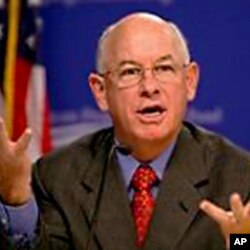The Obama administration said Wednesday that it is "interested" in new multilateral talks with Iran next month on a uranium-swap deal that would ease concerns about Tehran's nuclear intentions. Meanwhile, the U.S. Treasury Department blacklisted dozens of Iranian "front companies" in Europe that are said to be supporting nuclear weapons efforts.
The State Department says U.S. officials are ready to join in a new round of nuclear confidence building talks with Iran in mid-November, and that Tehran has given "indications" it will take part.
The talks, tentatively set for November 16 and 17 in Vienna, would bring together diplomats from Iran and six major world powers.
They would examine prospects for reviving a proposal offered a year ago, under which Iran would ship much of its enriched uranium stockpile abroad in return for fuel for a Tehran research reactor.
Iran initially accepted the proposal last November by the five permanent U.N. Security Council member countries and Germany - the P5+1 - but later backed away from the initiative.
In May of this year, Iran said it was ready to accept a variant of the swap plan proposed by Turkey and Brazil.
Asked Wednesday about a Wall Street Journal report that the United States is "pushing to revive" the Tehran research reactor, or TRR, talks, State Department Spokesman P.J. Crowley said the idea has merit as a prelude to broader negotiations on Iran's nuclear program.
"We still think the concept has potential value, so we would be interested in continuing to pursue that with Iran, if Iran is interested. At the same time, regarding the TRR, it's important to note that the proposal would have to be updated, reflecting ongoing enrichment activity by Iran over the ensuing year," said Crowley. "But this is something we potentially look ahead to engaging Iran in, through the so-called Vienna Group [which is made up of the United States, Russia, France and the International Atomic Energy Agency]."
Crowley said European Union chief diplomat Catherine Ashton has proposed the mid-November Vienna meeting and that Iran, while giving some signs of interest, has yet to formally respond.
A senior official here says that if Iran does accept, and return to talks for the first time in a year, the U.S. delegate would be Under Secretary of State for Political Affairs William Burns.
Coinciding with the comments here, the Treasury Department announced a further expansion of U.S. sanctions against Iranian entities and individuals said to be advancing Tehran's weapons of mass destruction efforts.
Treasury officials said 37 alleged Iranian front companies in Germany, Malta and Cyprus, and five Iranian businessmen associated with them, would face a freeze of any U.S. assets they might have and be barred from dealings with American companies.
State Department Spokesman Crowley said the expansion of U.N. and national sanctions is "getting Iran's attention," but that it remains to be seen whether they convince Tehran to act in what he called "its own long-term interest" and return to nuclear negotiations.
Iran says its nuclear program is peaceful. But Crowley said revelations of secret Iranian nuclear sites near the city of Qom and elsewhere raise doubts about Tehran's intentions.




